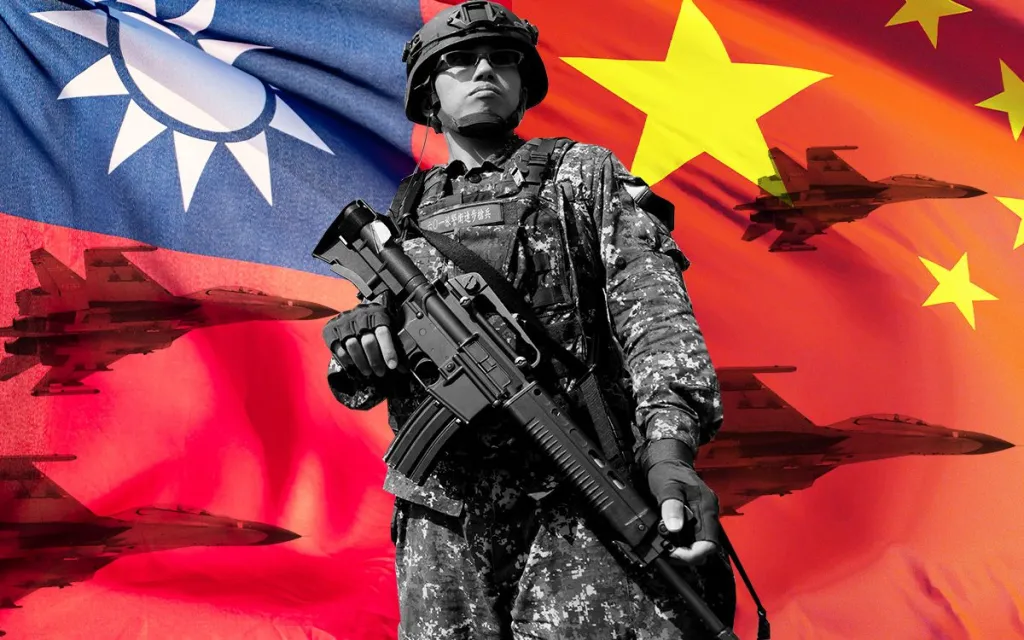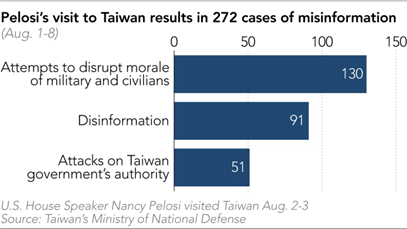
by Antonella Benedetto
When the Financial Times in July spread the news about the possible visit of Nancy Pelosi to Taiwan during the Asian tour, the politics and media environment in Taipei wondered if the visit could ever take place, while someone else hoped for its deletion. Pelosi would be the highest-ranking figure in office to visit Taiwan since 1997, when the then speaker of the House of Representatives, the Republican Newt Gingrich, travelled to Taipei. However. Moreover, 25 years ago, Republican Gingrich was in opposition to Clinton. And so that visit is recounted more as the product of an American domestic political clash. Conversely, Pelosi would not give Beijing a chance to justify what is happening because of an internal division in Washington since Pelosi is from the same Biden’s Party.
Indeed, Beijing threatened “serious consequences”. China’s People’s Liberation Army (PLA) has allegedly been conducting live-fire exercises and other operations in the waters near Taiwan’s main island for almost a week in retaliation for Nancy Pelosi’s contentious visit to Taipei. China’s military exercises that threaten Taiwan have established a new normal and are likely to “regulate” other armed drills off the coast or even more aggressive action closer to the island. According to Alessio Patalano, professor of war and strategy in east Asia at King’s College London, these aggressive actions will probably be frequent in the future with the final goal of creating fear and a sense of certainty in Taiwanese people.
However, another kind of warfare could create devastating damage – cyber warfare. International crises are ideal for cyber escalation, and Pelosi’s visit challenged the Island’s stability. Currently, the risk exists, but it is not high. First, there has been limited cyber activity—just a few cases have been made public, for example, the distributed denial of service (DDoS) attacks against Taiwanese Government websites, including those of the Defence Ministry. John Hultquist, the “Mandiant” Vice-President intelligence analyst, said the company had observed numerous Chinese information operations echoing Beijing’s message that Pelosi’s visit threatened peace and stability in the region. DDoS attacks generally cause brief service interruptions, are not particularly sophisticated, and are more inconvenient than anything else.

However, some points need to be clarified. Firstly, it’s unclear if the Chinese government is directly or indirectly responsible. However, according to Klon Kitchen, a senior fellow at the American Enterprise Institute think tank, cyberspace is a proper setting for China this week’s “signalling” exercise to express its disappointment with activity attacking Taiwan’s infrastructure or “reminding us of our vulnerability.” Secondly, cyber experts are still not sure about what has caused the down sites. Dmitri Alperovitch identifies the origin of the overload of internet traffic. Hultquist warns that simply because Taiwan claimed the attack came from abroad, there are not enough elements to conclude that the Chinese government is the author since rarely are DDoS attacks made by a single country.
The cyber operations China is currently conducting in Taiwan are nothing new under the sun. According to Chien Hung-Wei, chief of the cyber security department, in 2021, Taiwan’s government network received five million attacks and scans daily. Beijing has allegedly increased cyberattacks against Taiwan after President Tsai Ing-wen was elected in 2016. According to the report, the ministry’s information security and protection centre processed and identified over 1.4 billion “anomalies” between 2019 and August 2021 to prevent potential hacking. However, none of the twelve cyber events documented overall was severe enough to cause physical harm.
However, cyber activity has recently been used for disinformation about Pelosi’s visit to Taiwan. A Mandiant report has identified a new Chinese information operation. Websites and even 11/7 TV screens were hacked during the week of House Speaker Nancy Pelosi’s recent trip to Taiwan to display messages like “Warmonger Pelosi, get out of Taiwan!” and untrue statements like Chinese fighter planes had invaded Taiwanese airspace. Finally, although cyber espionage activities can be challenging to identify because they are secret by nature, some experts believe such operations are already in progress. Still, John Hultquist, predicts Chinese cyber espionage will go into “overdrive” as Beijing tries to understand more about Taiwan and American stances on this problem.
The Taiwanese government has been working to correct false stories or misinformation that has been spread through various local media sources recently. For instance, in September, the foreign affairs ministry responded to a remark by Ji Tinggang, a researcher supported by the Chinese government, that Taiwan’s diplomatic ties with Guatemala had irritated China, the United States, and Russia. There are worries that these publications could disseminate the myths Beijing wants to propagate. The elderly appears particularly vulnerable to this kind of news. Taiwan’s government, instead of regulating the industry, shut down newspapers, and restrict news stories on the internet, chose to collaborate with civil society organizations and social media businesses to combat fake news.
According to Lonergan and Mueller (Council on Foreign Relations), cyber activities are not the best means by which China can show resolve this crisis. Indeed, China’s recent cyber activities against Taiwan are insignificant compared to live-fire military exercises. China might also be hesitant to launch more expensive and sophisticated cyberattacks that risk destroying crucial accesses, preventing continued cyberespionage activities or future cyber operations in the event of war. Overall, this should relieve worries that cyber activity may worsen the crisis. But what if circumstances change? The situation is dynamic, experts have noted, and China might carry out more severe cyberattacks against Taiwan. Indeed, Tsai recognized this, saying that authorities have stepped up security measures and be prepared to act as necessary.
In the early stages of a conventional confrontation, either as a preventative measure or in response to an attack, Chinese military strategy considers essential cyber operations, particularly when facing a technologically superior country. Therefore, cyberattacks like command and control, communications, intelligence, or surveillance that resemble a military assault could be an early sign of an impending invasion of Taiwan. According to experts, China might take down the Taiwanese computer system that works for transportation, utilities, and defence activities to encourage a military strike. Although a cyberattack may not take down Taiwan’s defence system, it will still have an effect, not just from the logistic point of view but also people’s confidence would be undermined. Power plants, hospitals, water and electricity stations, leading companies could be possible targets.
Last year in June, the National Information and Communication Security Taskforce released the “National Cyber Security Program of Taiwan (2021 to 2024)” with the ultimate goal to “enhance the national security protection capacity and strengthen the security and resilience of basic communication networks.” The government is creating a cybersecurity agency: initially, 150 cybersecurity experts will be hired. Michael Cole, a Taipei-based senior adviser on countering foreign authoritarian influence at the International Republican Institute, believed that “Taiwan’s ability to survive a major [cyber] attack has yet to be tested”. Cyber activities are expected to growth especially in views of November local elections and 2024 January Presidential voting. According to Lev Nachman, an assistant professor at National Chengchi University in Taipei, “China will always try to influence the 2024 elections just as they have tried to influence every election”. However, data indicates that most of their infiltration attempts fail, with the 2020 presidential elections are the best example. Only circumstances will demonstrate in the future if the strategy will be effective.
In the meantime, tensions with China are at their worst in 40 years. China’s State Council has published a new white paper on “The Taiwan Question and China’s Reunification in the New Era”, after the most significant security challenge in the Taiwan Strait in more than 20 years. The report serves as an update to earlier white papers on Taiwan published in 1993 and 2000 and describes Beijing’s policy toward Taiwan under the “new era” of Xi Jinping’s leadership. The Preamble states indubitable that Taiwan is part of China. Consequently, the Party will act firmly to realize complete reunification in the following decades, which is “indispensable for the realization of China’s rejuvenation”. While some analysts have expressed concern that China may learn from Russia’s cyberattacks against Ukraine, which coincided with its invasion, at the moment we do not possess enough elements about what a possible hybrid Chinese invasion/cyberattack in Taiwan might evolve.
